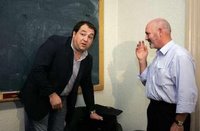Plus, the last Oliver Stone flick was a complete disappointment, and it has nothing to do with Alexander the Great being portrayed in all his homosexuality, no, the movie is bad, period.
But then today thanks to a right-wing blog I learned that Oliver Stone went to a Basque city to take part in a film festival and he took his turn at the microphone as an opportunity to... insult the Basques.
Here you have the note about how in a rather clumsy way he mixes some Bush bashing with the disrespectful generalization that the Basques are terrorists, all the Basques. Check it out:
By CIARAN GILES, Associated Press WriterThu Sep 28, 8:33 PM ET
Filmmaker Oliver Stone blasted President Bush Thursday, saying he has "set America back 10 years." Stone added that he is "ashamed for my country" over the war in Iraq and the U.S. policies in response to the attacks of Sept. 11.
"We have destroyed the world in the name of security," Stone told journalists at the San Sebastian International Film Festival prior to a screening of his latest movie, "World Trade Center." The film tells the true story of the survival and rescue of two policemen who were trapped in the rubble of the World Trade Center on September 11, 2001, after they went to help people escape.
"From Sept. 12 on, the incident (the attacks) was politicized and it has polarized the entire world," said Stone. "It is a shame because it is a waste of energy to see that the entire world five years later is still convulsed in the grip of 9/11.
"It's a waste of energy away from things that do matter which is poverty, death, disease, the planet itself and fixing things in our own homes rather than fighting wars with others. Mr. Bush has set America back 10 years, maybe more."
The director of blockbusters such as "Platoon," and "JFK" said the U.S. reaction to the attacks was out of proportion.
"If there had been a better sense of preparation, if we had a leadership that was more mature," he said. "We did not fight back in the same way that the British fought the IRA or the Spanish government fought the Basques here. Terrorism is a manageable action. It can be lived with," said Stone.
The arbitrary detentions, the torture, the preventive prison, the dispersion, the life term sentences, the fascist laws that make political parties illegal, the closing down of newspapers and elementary schools, the makeshift extraditions, it all has to do with a better sense of preparation.
And he said it in the home town of Iñaki de Juana, the home town of two of Mexico's six.
Well Mr. Stone, thanks for reminding us that the Basques are between the rock and the hard place. On one side the right-wingers hate us because we opposed Franco and Aznar, and on the other side, the left hates us because damn it, the main stram media says so.
Oh, by the way, congratulations to the organizers of the event for inviting this moron.



